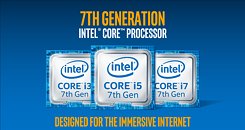wolf
Better Than Native
- Joined
- May 7, 2007
- Messages
- 8,566 (1.31/day)
| System Name | MightyX |
|---|---|
| Processor | Ryzen 9800X3D |
| Motherboard | Gigabyte B650I AX |
| Cooling | Scythe Fuma 2 |
| Memory | 32GB DDR5 6000 CL30 tuned |
| Video Card(s) | Palit Gamerock RTX 5080 oc |
| Storage | WD Black SN850X 2TB |
| Display(s) | LG 42C2 4K OLED |
| Case | Coolermaster NR200P |
| Audio Device(s) | LG SN5Y / Focal Clear |
| Power Supply | Corsair SF750 Platinum |
| Mouse | Corsair Dark Core RBG Pro SE |
| Keyboard | Glorious GMMK Compact w/pudding |
| VR HMD | Meta Quest 3 |
| Software | case populated with Artic P12's |
| Benchmark Scores | 4k120 OLED Gsync bliss |
The team over at Tom's Hardware have gotten their hands on Intel's new 'Kaby Lake' CPU - The Core i7-7700K. While the chip is not marked as an engineering sample, they cannot confirm with confidence that it is a retail part. They then did what we all hoped and expected, they put the new i7 through a series of benchmarks both at its stock speeds and overclocked. Without a retail Z270 series motherboard to test with, Kaby Lake compatible firmware was loaded onto their Gigabyte GA-Z170X-Ultra Gaming board.
In line with what has been reported so far, the stock clock speeds of their sample was 4.20GHz base and 4.50GHz max turbo boost with a TDP of 95W, up marginally from the i7-6700K's 91W. As tested the 7700K drew slightly more power under load than the 6700K whilst achieving benchmark results that are more-or-less in line with the percentage clock speed increase. Using the same core voltage for overclocking, the 7700K was able to manage a 4.8GHz overclock at 1.3v where the 6700K achieved 4.6GHz. As Intel did not change the core micro architecture between Skylake and Kaby Lake, it appears that save for HEVC and VP9 8/10-bit encode/decode and other possible features we may not yet know of, slightly faster clock speeds is the principal improvement. Given this is a pre-release test conducted on a motherboard that may not be able to unleash the full potential of the i7-7700K, the results should be taken with their appropriate pinch of salt. For the article and detailed findings, please follow the source link.

View at TechPowerUp Main Site
In line with what has been reported so far, the stock clock speeds of their sample was 4.20GHz base and 4.50GHz max turbo boost with a TDP of 95W, up marginally from the i7-6700K's 91W. As tested the 7700K drew slightly more power under load than the 6700K whilst achieving benchmark results that are more-or-less in line with the percentage clock speed increase. Using the same core voltage for overclocking, the 7700K was able to manage a 4.8GHz overclock at 1.3v where the 6700K achieved 4.6GHz. As Intel did not change the core micro architecture between Skylake and Kaby Lake, it appears that save for HEVC and VP9 8/10-bit encode/decode and other possible features we may not yet know of, slightly faster clock speeds is the principal improvement. Given this is a pre-release test conducted on a motherboard that may not be able to unleash the full potential of the i7-7700K, the results should be taken with their appropriate pinch of salt. For the article and detailed findings, please follow the source link.

View at TechPowerUp Main Site







 Heck, now even power consumption got similar.
Heck, now even power consumption got similar.